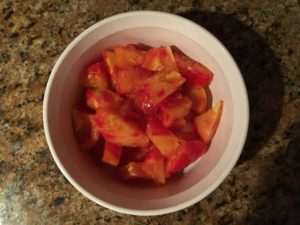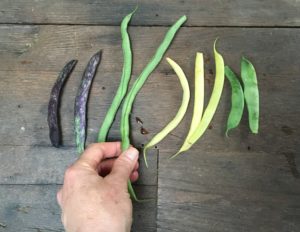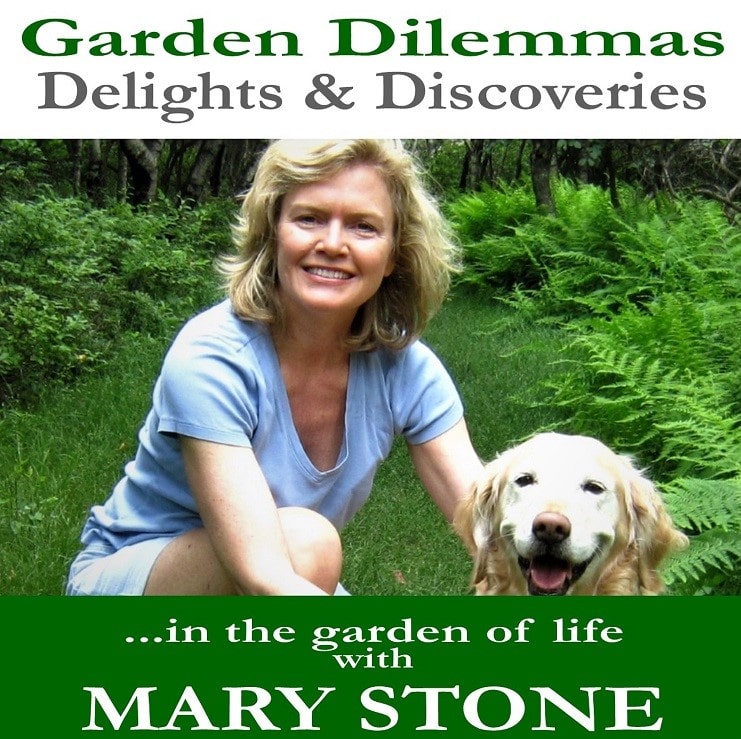Hello Fellow Readers,
Green beans aren’t only green anymore. And tomatoes come in all sorts of shades and mottled blends of colors. There are even tomatoes that stay green when they’re ripe. Charlotte of Stone Church, PA, asked if the funky vegetables are genetically modified (GMO). Indeed there’s a growing concern over genetically modified foods.
In 1999 the Safe Seed Pledge, sponsored by The Council for Responsible Genetics (a non-government non-profit), began with nine seed companies. Now over a hundred seed companies pledge that they “do not knowingly buy, sell, or trade genetically-engineered seeds or plants.”
There’s much confusion over genetically modified versus heirloom versus hybrids. Then there are organic seeds to consider.

Tigerella tomatoes
GMO versus Hybrid Seeds and Vegetables
Genetically modified (GMO) means organisms with genetically changed cells (the DNA), including crossing species. The goal is to improve resistance to pests and diseases, increase nutrients, and reduce spoilage, which all sounds positive. But the elephant in the room is the initiative to change the genetic makeup of crops to be resistant to herbicides.
You may know that Monsanto invented genetically modified crops resistant to their popular glyphosate herbicide Roundup. In other words, your corn, soybeans, wheat, and other edibles may include a hefty dose of synthetic herbicide. No, thank you.
Hybrids, conversely, are a cross-pollination of two different varieties of plants from the same species. It’s a process that happens in nature, though plant breeders intentionally cross-pollinate plants to improve characteristics such as disease resistance, color, fruit sizes, or improved taste and yields. And hybrids accomplish all these good things without being genetically modified.
Heirloom and Organic Seeds
Some define heirloom seeds as open-pollinated (by wind or insects) that date back 40 to 50 years; others say before World War II, which began in 1939. One universal meaning of heirlooms is – because they are open-pollinated seeds, they can be collected from the parent plant year to year and produce the same characteristics, unlike hybrids or GMOs.
Organic seeds are grown following the USDA’s National Organic Program (NOP), which doesn’t allow synthetic pesticides and fertilizers, sewage sludge (biosolids), or fresh manure. They must be non-GMO. Many heirlooms can be organic, as they came before synthetic fertilizers and pesticides.
Funky Vegetables can be Organic and non-GMO.

An assortment of Fun and Funky Beans
It’s a long answer to Charlotte’s question. In a nutshell, funky veggies can be organic and even heirlooms. While genetically modified seeds and food don’t have to labels saying they are, you can seek out those labeled “non-GMO.” And don’t let brands touting “Natural” fool you; it does not mean they are non-GMO or not processed.
Last season I was thrilled to receive an assortment of goodies from Dennis of Blairstown, whose bountiful veggie garden always delights. (You’ve met Dennis in the recent story about the Woodcock Dance and Making a Meadow). Dennis shared, “There are seven kinds of beans in the mix: Rattlesnake pole beans, Italian red pole beans, Fortex long pole beans, Yellow wax bush beans, Italian flat bush beans, Green bush beans, and Galopka Polish yellow bush beans.”
How pretty! And delicious. I’ve always been a fan of combining veggies in flower beds. Now with all the fun colors, vegetables can surely add to the display and be wholesome.
It’s up to us to pressure food growers and providers to let them know that we care about our food by choosing Non-GMO (and Organic even better).
Garden Dilemmas? AskMaryStone@gmail.com and your favorite Podcast App.
There’s more to the story in the Garden Dilemmas Podcast:



Great read Mary!
Thank you.
Whether in the US or abroad, few are aware that there is a distinction between these plants,veg, fruit and their seeds. Are prices higher for heirloom? Are GMOs easier to access in shops? Lack of education means no one cares about to find out what you plant and what you eat.
Thank you for your kind words and for reading my column. Yes, Heirloom vegetables are more expensive. But non-GMO are readily available. Look for ‘Non-GMO” when shopping as, at least in the US, there are no rules about labeling GMO (Genetically Modified) foods. Those that are NON-GMO are savvy to market themselves as such. Hope this helps, Mary Stone